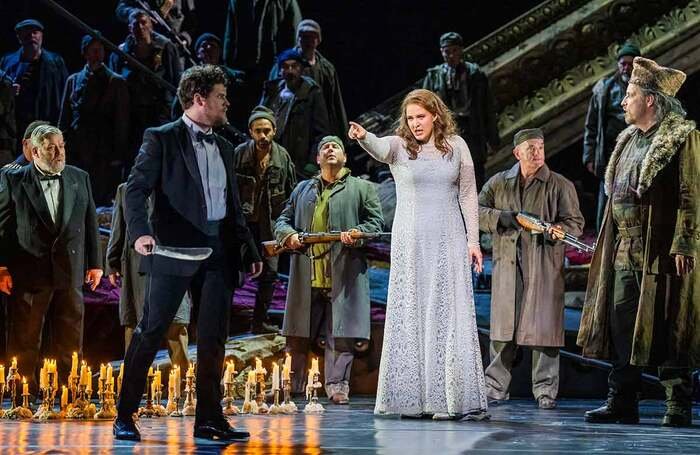Tannhäuser @Royal Opera House 2023
First written in 1845, this early Wagner opera is based on the life of poet and composer, Tannhäuser. The 1845 operatic version was subsequently revised in 1861 to a Paris version, sung in French and thereafter to a Vienna version in 1875, sung in German, which is the version commonly used today.
This complicated story opens with Tannhäuser enjoying the cavorting of the subterranean realm of Venusberg, having become the consort to the goddess Venus after he believed his creativity was being stifled in his earthly home of Wartburg. However, he tires of all the sensual pleasures that he enjoyed and travels back home to his home. He yearns for his former love, Elisabeth, and enters a song contest, where he sings to the hedonistic delights of Venus. He is castigated by all around him and is ordered to seek forgiveness from the Pope in Rome. Despite trying, he never achieves this and once again seeks Venus. However, the pull of Elisabeth and her death allows him to remain an earthly being and die as a holy man.
This production of Tannhäuser was first seen in 2010 and revived for the third time in a generally dull production. The director, Tim Albery, gives us a grey visionless staging that does not inspire the audience despite the generosity of the music. The opera starts with the glory of the opening overture and the energy of the Venusberg scene, with the dancers cavorting energetically across the stage using a large, long dining room table as a prop. It is an exciting opening, sorely lacking in the rest of the opera, which becomes a rather tepid affair.
In Act I, the designer, Michael Levine starts with a set within a set, or an opera house within an opera house, and that is the best that we get. Albery seems to deal with so much symbolism in this opera and the destruction of the “other” opera house in Act II is at its core. The same symbolism applies to the people of Landgrave who are turned into a group of thugs carrying their “Uzis” across their shoulders. It is perhaps a nod in the direction of the current Russia/Ukraine war. The Act is only visually saved by some sharp motion from the movement director, Maxine Braham, who intelligently allows candlelight to provide a focus on stage into an otherwise drab scene. Act III might be the more interesting of the Acts, but gloom is still the order of the day, as the crowds return from seeking forgiveness from the Pope in Rome. Disappointingly, the deaths of Elisabeth and Tannhäuser that follow, have no majesty attached to them. Happily, there is real majesty in some of the singing.
The Russian mezzo soprano Ekaterina Gubanova sung Venus with an elegant warmth and sensual sound. However, the Tannhäuser of the German heldentenor Stefan Vinke was a real struggle. He did not sing at the opening night due to illness and he struggled manfully on the second night of 1st February, but eventually thereafter gave way to the opening night’s vocal replacement of Norbert Ernst. The Austrian tenor Ernst does not have the vocal bark that Vinke possesses. His is a more lyrical interpretation with a smaller voice but no less appealing. He is a consummate performer and specialises in the Wagner repertoire. Finnish bass, Mike Kares, was a stout Landgrave – the leader of the pack! Canadian baritone, Gerald Finley, was an impressive Wolfram; his sophisticated interpretation was both dramatic and sublime, and amongst all the principals - apart from Elisabeth - he could act too. His Act III aria «O du, mein holder Abendstern» was gloriously sung. The rest of the cast were great in their roles.
This brings us to the remarkable Elisabeth of Lise Davidsen. The world’s leading Norwegian soprano was magnetic in her performance, with a thrilling voice that crackled with electricity every time she performed. The brushstrokes of her tone were sublime with emotional weight in her tonal flexibility, constantly flowing. Hers was a performance to cherish. A note too for the Jette Parker Artist Sarah Dufresne who sang a beautiful Young Shepherd.
Sebastian Weigle was the principal conductor of the Berlin State Opera, and he is currently music director of the Frankfurt Opera, and his German and Wagner credentials are impeccable. As the evening’s conductor, he was supported by an exceptional chorus at the top of its form. However, there were too many occasions when the slowness of pace almost brought a halt to proceedings. There appeared to be an overall lack of intensity in the orchestral output.
Despite the complex staging issues – perhaps that is why Wagner regarded Tannhäuser as unfinished business, just before his death – this was musically an admirable performance, with some of the music from the opening overture; Elisabeth’s aria «Dich, teure Halle»; the pilgrim’s return; and Wolfram’s guide to Elisabeth on her way to heaven; being absolutely sublime and deserved to be savoured.
David Buchler
Click here to book your tickets for The Friends of Israel Opera’s Opera Evening ‘In Performance’ ‘A SOPRANO MEETS A PIANO’, on Thursday 23 February 2023 at 7PM! The concert will take place at Central Synagogue, 36 Hallam Street, London W1W 6NW.
Your kind and generous donations are also welcomed here!
If you have any queries please email Jill Bennett at office@fio.org.uk or ring 07973 129317.



